After a long day of rumors something was coming, late in the day we got a superseding indictment in the Mar-a-Lago case. It includes both a new defendant and new charges. This, apparently, is what the grand jury continued to work on over the last few weeks.
Here’s what you need to know:
New Defendant: The new defendant is Carlos De Oliveira, 56, a resident of Palm Beach Gardens, Florida. He, like co-defendant Walt Nauta, is a Trump employee. He was a valet at Mar-a-Lago until he became a property manager in January of 2022. It turns out that he lied to agents during an interview. Never a good idea.
His misplaced loyalty has landed him in the middle of the indictment, where he was added to the original conspiracy charge, along with Trump and Nauta. (Previously count 32, now count 33).
New Charges: Here is our cheat sheet from the original indictment. The superseding indictment adds four new charges. The first is a willful retention of documents charge brought against Donald Trump. There are two obstruction charges against all three defendants for trying to destroy video footage from security cameras after DOJ subpoenaed it. And there is a final count charging De Oliveira with lying to FBI agents during an interview.
Retention: The old indictment contained 31 counts alleging Trump illegally retained national defense information after leaving the presidency. The new indictment adds new count 32, which concerns the document Trump infamously waived around at his Bedminster golf course in New Jersey, in a meeting with a writer and a publisher for Mark Meadows’ forthcoming book. It is a top secret document that we’ve come to learn contained battle plans for Iran.
A sentence was added to paragraph 35 in the original complaint, to make clear that the incident being recounted in that section involves the document Trump is charged with in new count 32. The now-familiar tale actually begins in paragraph 33.
The final sentence is the new addition, “The document that TRUMP possessed and showed on July 21, 2021, is charged as Count 32 in this Superseding Indictment.” There was some confusion originally about whether this story involved a real document or whether it was more Trump braggadocio. Prosecutors subpoenaed the document from Trump, whose lawyers responded they were unable to find a document matching that description. But prosecutors have confirmed a real document was involved, and it seems likely given the date in new count 32, which alleges Trump possessed that document until January 17, 2022, around the date he returned 15 boxes of documents to the National Archives, that it was found there.
Why add this new charge? Some folks have speculated it might make it easier to get the audiotape of Trump’s conversation into evidence at trial. But I don’t think that’s the reason. Even if it’s not part of a charged count, under the rules of evidence, prosecutors can introduce evidence of other crimes or bad acts to prove intent, knowledge, absence of mistake, etc. The tape of Trump acknowledging he has classified material in his possession and couldn’t declassify it since he’s no longer president make this squarely admissible whether the document was charged or not.
The document was important to charge because it wasn’t “just” a document in a box in Trump’s ballroom or bathroom, it was a document he pulled out, waived around, identified, and put in view of multiple people who lacked a security clearance. Trump’s cavalier treatment of the Iran battle plan drives home how serious his crimes are, and it’s an important inclusion among the retention counts. It’s tough for a juror to look at this kind of evidence and refuse to vote to convict because it’s not a serious crime.
Moreover, Trump gave an interview after the first indictment was handed down, where he told Fox News Host Brett Baier it hadn’t really been a classified document. “There was no document,” he said. “That was a massive amount of papers,” and some additional nonsensical bluster. Now the government has him dead to rights, lying about it. Juries don’t like that kind of thing. All of this is designed to make the indictment strong, even in the face of a Trump-leaning juror.
Obstruction: The obstruction counts are the real eye-popper in the new version of the indictment. They are new counts 40 and 41, and they put Donald Trump squarely in the middle of efforts, laughably unsuccessful if the matter was any less serious, to destroy security video footage he wanted to keep out of the hands of the grand jury. The footage depicts movement of boxes with classified material and some of the acts of obstruction that are ultimately charged, so you can understand why Trump didn’t want DOJ to get its hands on it. Thanks to “Trump Employee 4,” a person with a moral compass and a backbone that few of the people Trump surrounds himself with ever seem to possess, Trump didn’t succeed. Employee 4 refused to destroy the video.
Next time someone suggests to you that Joe Biden did the same thing Donald Trump did and isn’t being prosecuted, remind them that Joe Biden not only voluntarily returned classified material in his possession, he never orchestrated a conspiracy with his employees to destroy security footage of his efforts to keep that material out of the government’s hands.
Employee 4 looks like a cooperating witness for the government—too much of the information contained in the indictment, especially the details of conversations, would need to come from him for that not to be the case.
So, if you’re looking for a hero this week, Trump Employee 4 is a solid candidate. The allegation that Trump tried to destroy video evidence pushes this case over the top. It demonstrates he was conscious of his guilt. When Employee 4 testifies at trial that "DE OLIVEIRA told Trump Employee 4 that 'the boss' wanted the server deleted,” it’s chef’s kiss.
False Statements: The last of the new counts is count 42, which charges only De Oliveira with making false statements to FBI in a voluntary interview after being advised it was a crime to lie to them. This charge is open and shut—De Oliveira made certain statements, and they aren’t true. The only other thing the government needs to prove is that they were material to the investigation. Since these statements involve the handling of Trump’s boxes when they first came to Mar-a-Lago after he left the White House, and how they were stored, they undoubtedly had bearing on important information the FBI was acquiring to conduct its investigation.
Faced with this charge—an easy one for the government to prove, along with the others, especially the obstruction charges which carry lengthy penalties—it’s tough to figure why there wasn’t a plea agreement instead of an indictment. Perhaps that reality will dawn on De Oliveira as the case progresses, and he’ll end up testifying against Trump. Or perhaps he, like so many others, will stick by their Don. Maybe there’s a promise of a future pardon or some other benefit. One of the mysteries of Trump’s slick success with avoiding legal accountability remains his ability to prevent people from cooperating and testifying against him to save themselves.
The Protective Order: Jack Smith also filed a renewed motion for a protective order today—Judge Cannon still hasn’t put in place the basic order that permits classified discovery to proceed. Instead, after Trump’s lawyers unreasonably refused to agree with terms designed to protect classified materials they would receive in discovery, Judge Cannon ordered the government to go back and continue to try to work with them. They did, and today’s motion identifies two outstanding areas of contention. One is Walt Nauta’s insistence that he should have access to classified information—the Special Counsel says that’s unnecessary because he isn’t charged in any of the retention counts, but his counsel, who now possesses a security clearance, will be able to see it and can move to let Nauta view anything that does become relevant to his defense. This one should be resolved, easily, in the government’s favor.
Then there’s Donald Trump. He doesn’t want to have to go to a SCIF (Sensitive Compartmented Information Facility) to view classified material with his attorneys. He wants to be able to see it in the comfort of his own home. Trump still doesn’t get he’s not going to receive special treatment, unless Judge Aileen Cannon gives it to him. If she does on this point, look for Jack Smith to appeal immediately and win. Trump’s request flies in the face of clearly established law on handling classified documents—not exactly a shocker given the nature of this prosecution.
So, what’s going on here? Trump is making this argument, not because he thinks it’s a good one—it’s clearly a loser. He’s making it to set up an argument down the road that the trial has to be delayed even further. The argument will go something like this: President Trump is the Republican nominee for the presidency and he has a busy, full schedule. He can’t be running over to the courthouse in Fort Pierce or Miami to look at evidence with his trial every afternoon. We haven’t had enough time to prepare his defense. And it’s the government’s fault; they wouldn’t accommodate us. We need more time to be properly prepared for trial.
Judge Aileen Cannon, if past is prologue, may fall for it. But the argument is tone deaf, a real failure to read the room, or at least the Special Counsel’s office. Jack Smith was quick to point out that “Defendant Trump’s personal residences and offices are not lawful locations for the discussion of classified information, any more than they would be for any private citizen.” That’s true. And here’s the kicker, “There is no basis for the defendant’s request that he be given the extraordinary authority to discuss classified information at his residence, and it is particularly striking that he seeks permission to do so in the very location at which he is charged with willfully retaining the documents charged in this case.” Judge Cannon has set a leisurely schedule for discovery; now would be the moment for her to tell defendant Trump that she means it, if in fact she does, and that he, like anyone else facing similar charges, can spend time with his lawyers in a SCIF.
Donald Trump, self-described victim, has met Jack Smith, career prosecutor. And Smith isn’t buying it.
We’re in this together,
Joyce




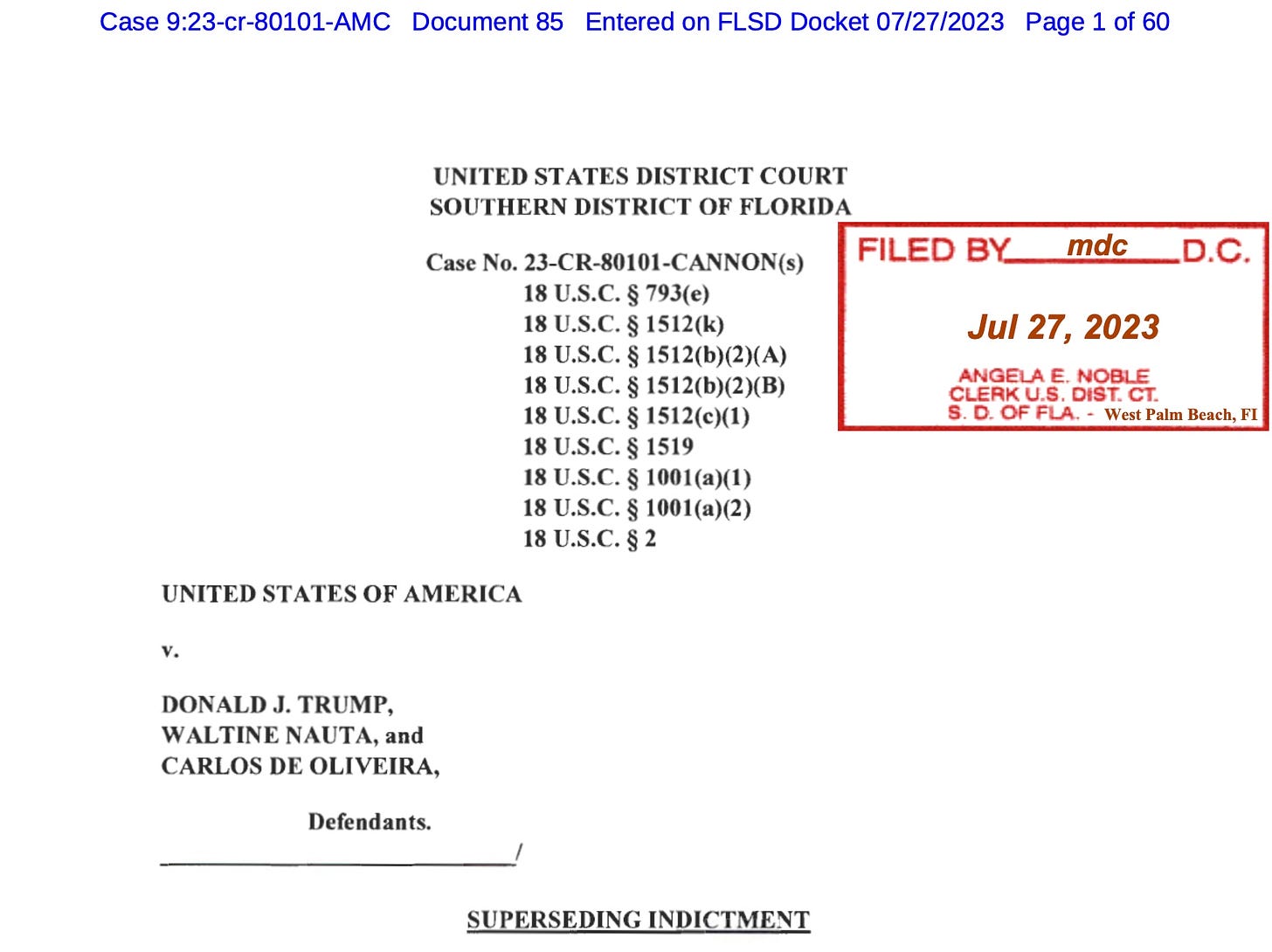
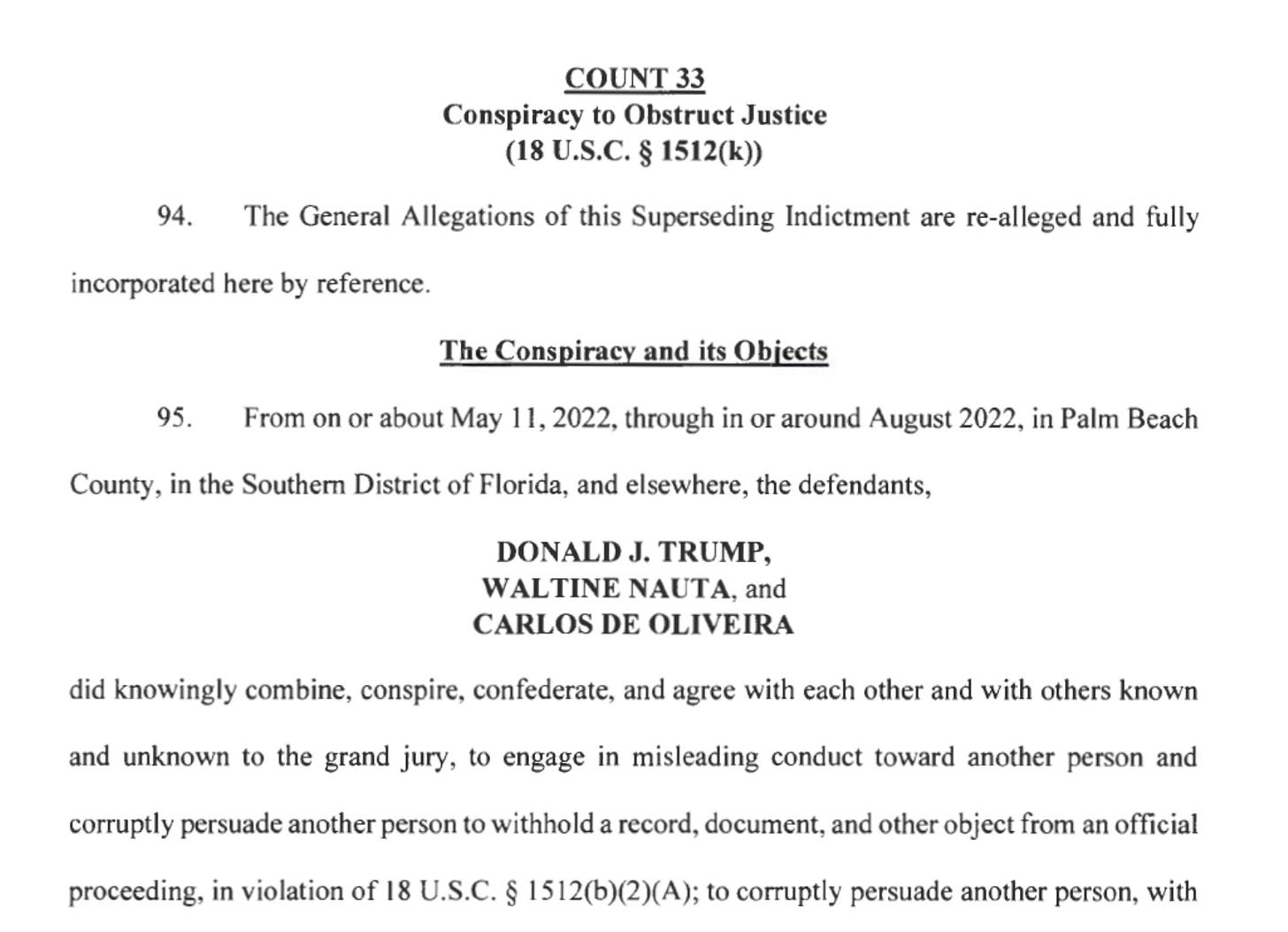

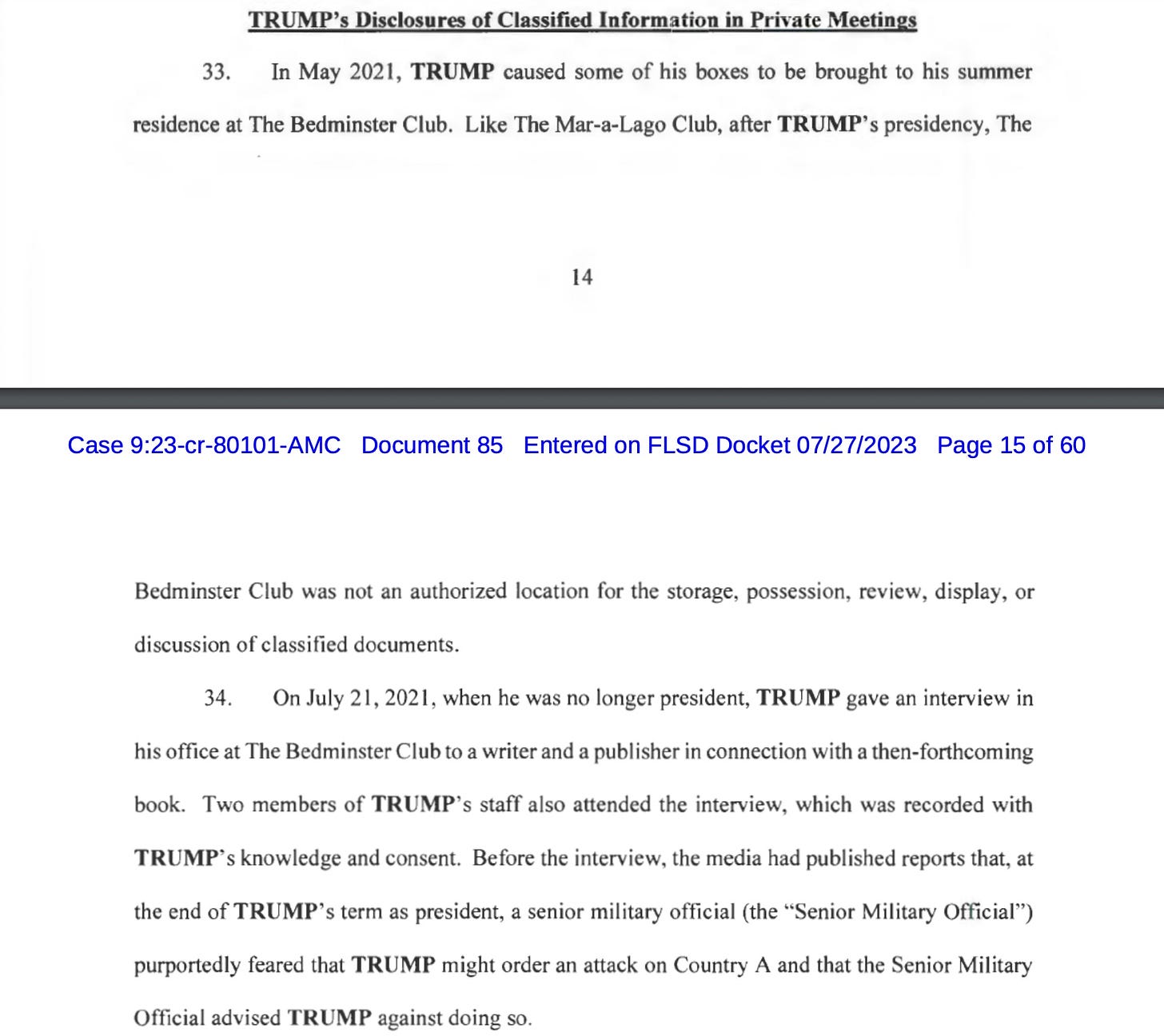
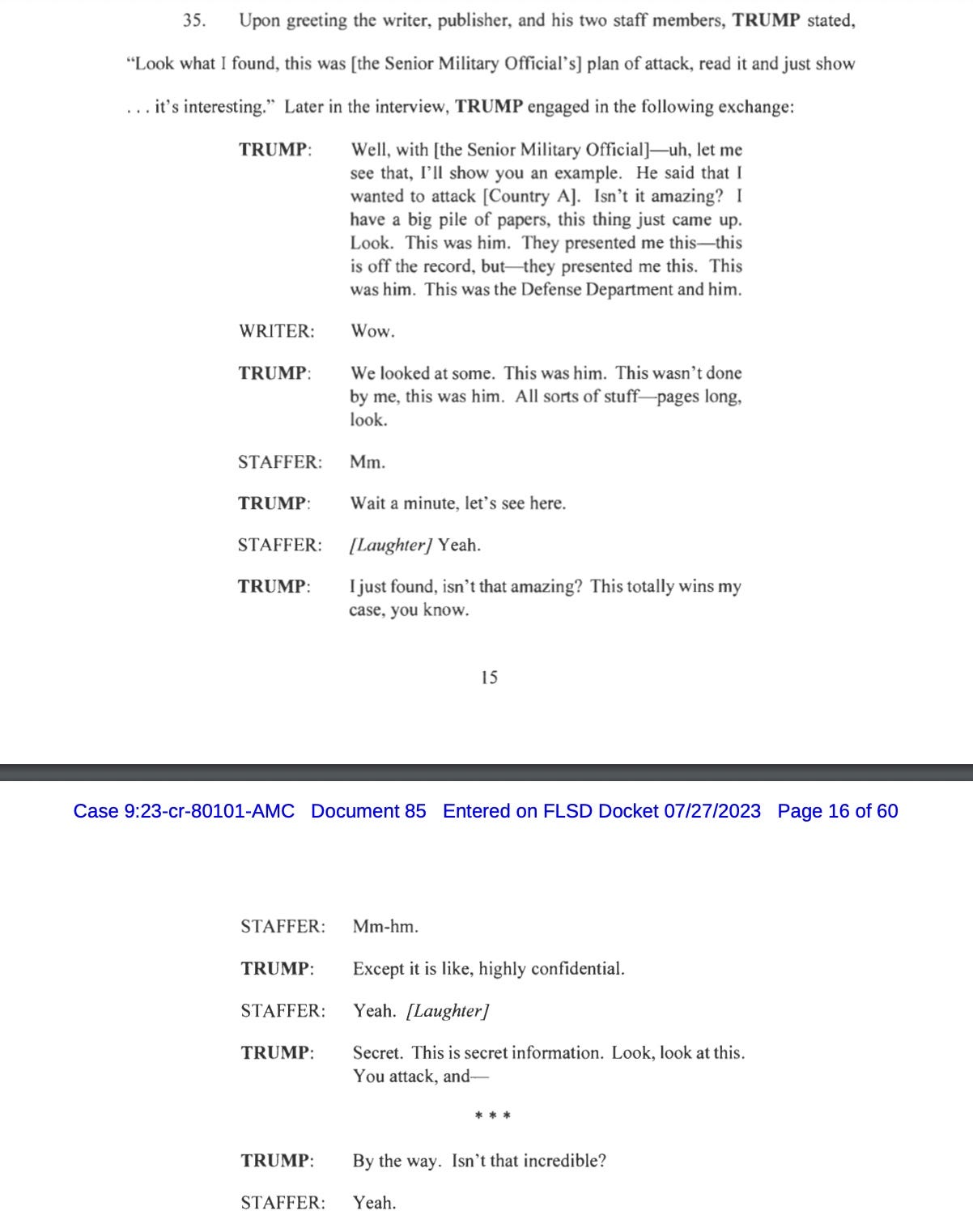
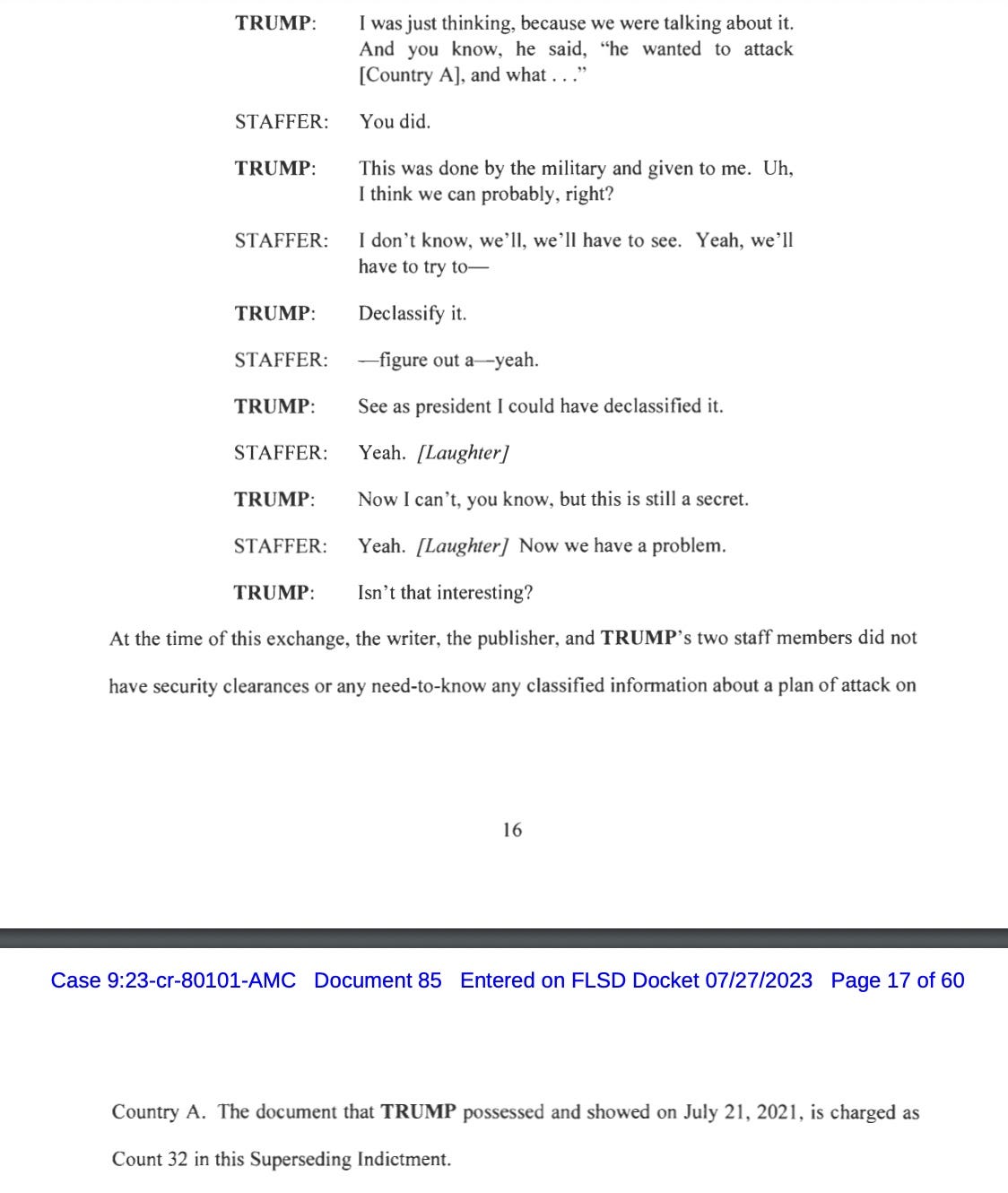
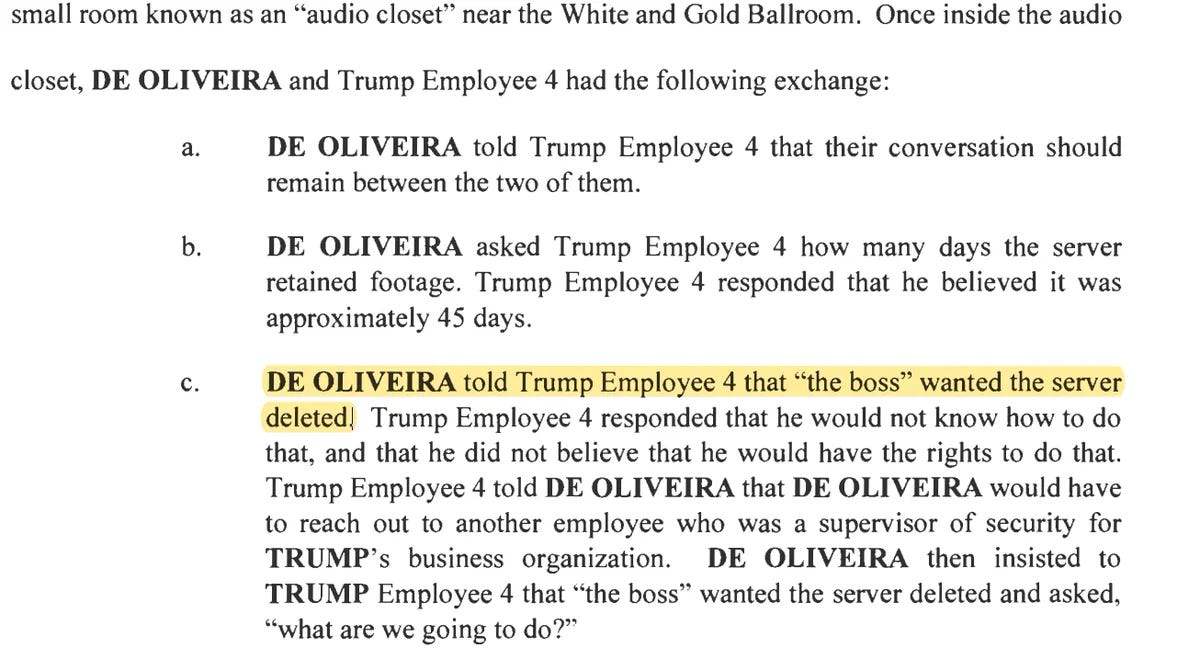

Tonight while watching MSNBC, I was struck by the focus given to the statement from Employee 4, "I don't have the rights." Perhaps I misread the intent. It sounded like the people I heard were making this guy out to be some kind of saint because he refused to delete the files on the server. But that phrase is I.T. talk. "Rights" in server lingo simply refers to required permissions. Someone who administers a server has "admin rights", and someone with a standard user account would not have those. So I took the phrase to simply mean he quite literally couldn't erase anything because he did not have the "rights" on the server to perform that function. I mean, I guess he could've taken a baseball bat to the server, and he didn't, so that's something. And maybe he is a saint. But it just sounded like too many people were reading too much into the word "rights."
What a great article! You make learning enjoyable. I have one thought. Why isn’t the goal of running for president to evade prosecution the same as him being “a flight risk?” He just hides in another way. He shouldn’t be allowed to use the election as an escape. He should have no escape.